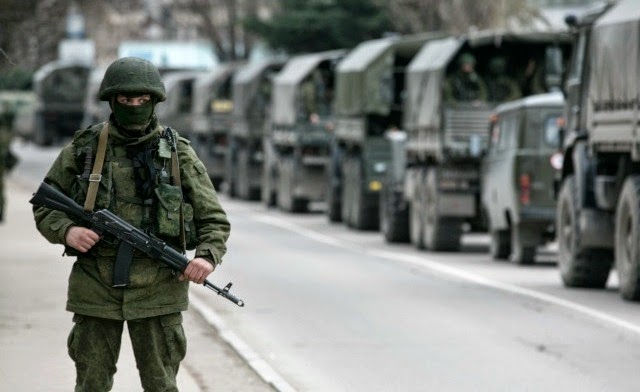 |
| Pro-Kremlin activists rally to celebrate the incorporation of Crimea into Russia |
The Crimean Khanate, a vassal from 1441, of the Ottoman Empire, was conquered by the Russian Empire in 1783. Following its incorporation into the Russian Empire, the Crimea became the "heart of Russian Romanticism".
The first Russian ruler to convert to Christianity did so more than a thousand years ago with the aid of a Byzantine Orthodox priest in the former Greek colony of Khersonesos, near the modern Crimean port of Sevastopol. In a speech delivered earlier this year to justify the current incursion, Putin reached back and invoked this narrative. “Everything in Crimea speaks of our shared history and pride, this is the location of ancient [Khersonesos], where Prince Vladimir was baptized in [988 AD]. His spiritual feat of adopting Orthodoxy predetermined the overall basis of the culture, civilization and human values” of all Russians.
Putin is not the first Russian leader to hold up the Crimea, for centuries home to a myriad of innumerable inhabitants, as a sacred site of Russian Orthodox culture. When Tsarina Catherine the Great annexed the peninsula in 1783, she proclaimed it an eternal part of Russia. Her imperial courtiers then adopted the Greek name for Crimea -Taurica - instead of the Turkic Krim (or Crimea) used by the region’s native Muslim Tatars. Russian pre-eminence over the Black Sea, as far as Catherine was concerned, could restore the glory of the fallen Byzantine Empire, lost to the Muslim Ottomans.
With its Black Sea fleet based in Sevastopol, Tsar Nicholas I knocked the Ottoman Empire out of the region – a hugely symbolic feat considering Russia's tricky relationship with its Muslim population and its centuries in need of a fleet with access to the Mediterranean. But Nicholas' superciliousness in the Crimea in part led to the Crimean war with Britain and France, whose leaders attempts to stop Russia's expanding borders and to slow its influence in the Middle East saw somewhere between half a million to a million people die and led to more myth-making. The Russians endured a grinding, year-long siege at Sevastopol that, despite their heroics, resulted in the eventual Russian surrender; nearly a century later, Sevastopol’s Soviet defenders were almost wiped out in a doomed bid to repel the encircling Nazis.
Former Soviet leader Mikhail Gorbachev told Russian media that the annexation of Crimea, which after decades of resettlement and the slaughter and forced exile of many Tatars had become majority Russian, would redress a Soviet-era “mistake” of attaching the peninsula politically to the Ukrainian republic. Putin subsequently lamented how the disintegration of the U.S.S.R. transformed tens of millions of Russians into minorities living in new states to which they didn’t necessarily want to belong. Russia felt that she had not just been robbed, but plundered. Millions of Russians went to bed in one country and woke up in another, transformed overnight into minorities within the former Soviet republics and the Russian nation became the biggest, partitioned nation in the world.
History haunts arguments about what Putin thinks, how much further he might go, and what should be done. Some commentators focus on how Putin sees himself in history, while others, like me, draw historical analogies. But no matter what parallel people choose to explain Putin’s power play in the Crimea, the region will probably continue to change hands as it has done for the last thousand years.




